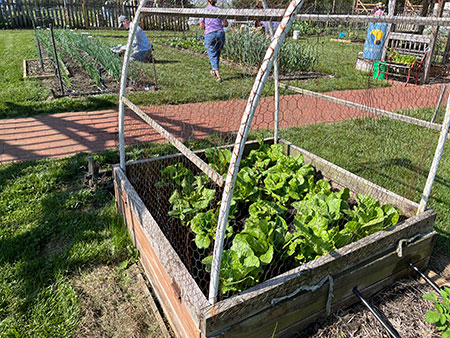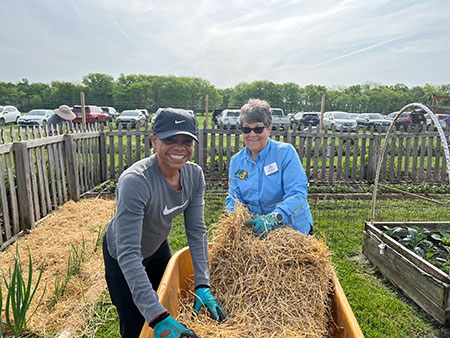Backyard Garden: Vegetable Garden H

This garden demonstrates methods for maximizing space and production in smaller gardens that are typical in a backyard. This includes planting methods, pest management, various trellis and staking options used in vegetable gardens.
The vegetable and flower selections in Bed H are representative of what would be planted in backyard gardens in Eastern Kansas.
Points of Interest:
- T- Stakes to support tomatoes.
- Tomatoes are a staple in many backyard gardens. Staking, trellising or caging are methods used to support tomatoes as they grow. Storing the various supports can be a challenge.
- T-Stakes can be stored in a small footprint and can be used for many years.
- Factors to consider when selecting tomato cages/stake.
- Strength
- Ease of use
- Installation
- Staying upright in Kansas wind/weather
- Maintaining upright plant (tying plant as it grows)
- Picking fruit
- Long term durability
- Ease of storage
- Overall cost to consider (approximate cost in 2024 - $15 per T-Stake)
- Factors to consider when selecting tomato cages/stake.
- Materials for T-Stake Construction
- 16 x 50 in. galvanized feedlot panel.
- For tomatoes - with bolt cutters, cut 3 or 4 rectangles across x (50 inch) height of panel.
- For peppers - with bolt cutters, cut 2 rectangles across x (50 inch) height of panel
- 6 ft. tall, studded T post
- 3 zip ties/post
- Post driver
- Bolt cutter
- Twine for training plants as they grow.
- DIY T-Stake Video
- 16 x 50 in. galvanized feedlot panel.
- Seed Tape
- Planting tiny seeds can be challenging. In Kansas planting is rarely done without wind to carry away tiny seeds.
- Benefits of using seed tape vs. direct sewing
- Seed does not blow away in the wind
- Seed is evenly spaced, eliminating thinning
- Ease of planting tape vs. individual seeds
- Limited mobility – don’t have to bend over to plant individual seeds
- Limited dexterity
- Limited eye sight
- Better use of seed, resulting in cost saving
- Easy for all gardeners – novice to experts
- To make the seed tape single ply toilet paper and watered down school glue were used in Bed H.
- For detailed demonstration click here for The Kansas Healthy Yards video
- Companion Planting
- The goal is to plant known plant combinations that will be beneficial to reduce pest pressure and promote healthy plants. An example of companion planting is to plant Zinnias around and, in the garden, to attract pollinators to the garden. Bees, ladybugs, wasps, butterflies and hummingbirds help to disperse and distribute pollen as they visit the garden to feed on the blooms of the zinnia. This can help increase harvest totals of your vegetable crops. Zinnias bring beauty and color to the garden and make nice cut flowers for arranging and sharing with family and friends.
- Bed H has nasturtiums, marigolds, zinnias, sunflowers and dill as companions with the vegetables.
Tips:
Some backyard gardens have limited space so creating a succession planting plan to maximize what can be grown in season allows for increased production in the garden.
There are multiple ways to succession plant.
- Plant the same vegetable each week over two or three weeks to spread out the harvest. (Examples: lettuce, radish, turnips)
- Plant the same vegetable in the early spring and a different vegetable in the late spring or early summer. A third possibility is another vegetable in the early fall. (Examples: Bed H will plant green beans and sweet potato after cool season vegetables)
- Plant the same vegetable at the same time but different varieties that have maturity dates to spread the harvest out over a longer period. (Examples: Bed H plants multiple varieties of tomatoes that have different days-to- maturity at the same time, different disease resistance profiles, determinate and indeterminate)
Other Resources:
Vegetable Gardening

Garden Address
35230 W 135th St
Olathe, KS 66061
Master Gardeners are available to answer questions and provide tours while they work the gardens Wednesday mornings, March to October. To schedule a visit on another day (M-F), please contact us at bygjocoemg@gmail.com
Have questions? The Garden Hotline is staffed by trained EMG volunteers and Extension staff who will assist you with questions.
Phone: (913) 715-7050
Email: garden.help@jocogov.org